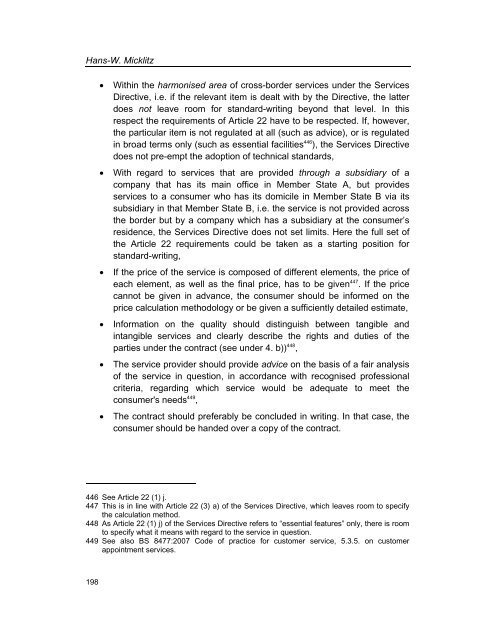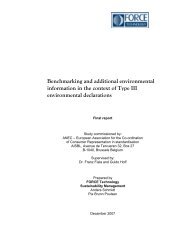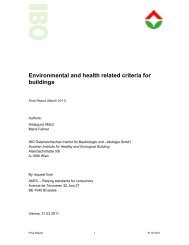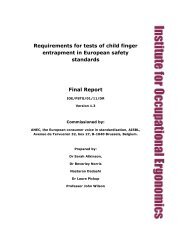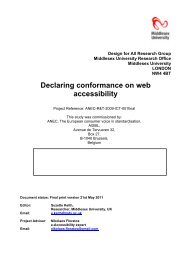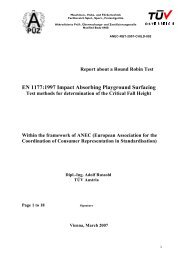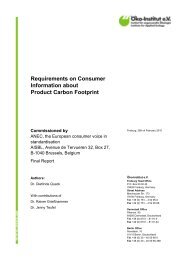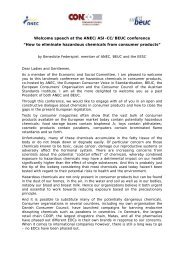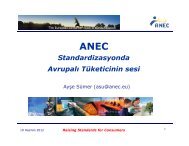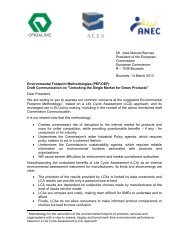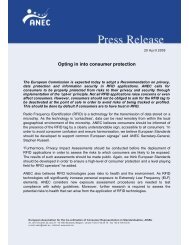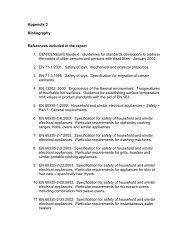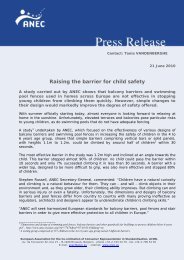Services Standards: Defining the Core Consumer Elements ... - ANEC
Services Standards: Defining the Core Consumer Elements ... - ANEC
Services Standards: Defining the Core Consumer Elements ... - ANEC
You also want an ePaper? Increase the reach of your titles
YUMPU automatically turns print PDFs into web optimized ePapers that Google loves.
Hans-W. Micklitz<br />
• Within <strong>the</strong> harmonised area of cross-border services under <strong>the</strong> <strong>Services</strong><br />
Directive, i.e. if <strong>the</strong> relevant item is dealt with by <strong>the</strong> Directive, <strong>the</strong> latter<br />
does not leave room for standard-writing beyond that level. In this<br />
respect <strong>the</strong> requirements of Article 22 have to be respected. If, however,<br />
<strong>the</strong> particular item is not regulated at all (such as advice), or is regulated<br />
in broad terms only (such as essential facilities 446 ), <strong>the</strong> <strong>Services</strong> Directive<br />
does not pre-empt <strong>the</strong> adoption of technical standards,<br />
• With regard to services that are provided through a subsidiary of a<br />
company that has its main office in Member State A, but provides<br />
services to a consumer who has its domicile in Member State B via its<br />
subsidiary in that Member State B, i.e. <strong>the</strong> service is not provided across<br />
<strong>the</strong> border but by a company which has a subsidiary at <strong>the</strong> consumer’s<br />
residence, <strong>the</strong> <strong>Services</strong> Directive does not set limits. Here <strong>the</strong> full set of<br />
<strong>the</strong> Article 22 requirements could be taken as a starting position for<br />
standard-writing,<br />
• If <strong>the</strong> price of <strong>the</strong> service is composed of different elements, <strong>the</strong> price of<br />
each element, as well as <strong>the</strong> final price, has to be given 447 . If <strong>the</strong> price<br />
cannot be given in advance, <strong>the</strong> consumer should be informed on <strong>the</strong><br />
price calculation methodology or be given a sufficiently detailed estimate,<br />
• Information on <strong>the</strong> quality should distinguish between tangible and<br />
intangible services and clearly describe <strong>the</strong> rights and duties of <strong>the</strong><br />
parties under <strong>the</strong> contract (see under 4. b)) 448 ,<br />
• The service provider should provide advice on <strong>the</strong> basis of a fair analysis<br />
of <strong>the</strong> service in question, in accordance with recognised professional<br />
criteria, regarding which service would be adequate to meet <strong>the</strong><br />
consumer's needs 449 ,<br />
• The contract should preferably be concluded in writing. In that case, <strong>the</strong><br />
consumer should be handed over a copy of <strong>the</strong> contract.<br />
446 See Article 22 (1) j.<br />
447 This is in line with Article 22 (3) a) of <strong>the</strong> <strong>Services</strong> Directive, which leaves room to specify<br />
<strong>the</strong> calculation method.<br />
448 As Article 22 (1) j) of <strong>the</strong> <strong>Services</strong> Directive refers to “essential features” only, <strong>the</strong>re is room<br />
to specify what it means with regard to <strong>the</strong> service in question.<br />
449 See also BS 8477:2007 Code of practice for customer service, 5.3.5. on customer<br />
appointment services.<br />
198


